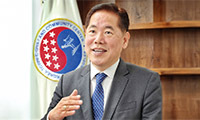▶ Oh Donggeon / North Hollywood 9th Grade
The modern DST is credited to a New Zealand entomologist George Vernon Hudson. After realizing that the days become shorter and lengthen on different times of the year, in 1895, Hudson proposed to the Wellington Philosophical Society that clocks be shifted two hours forward in October and vice versa in March to make use of the extra sunlight. The idea seemed promising, but failed to receive much attention.
In 1905, William Willet, thinking that the extended daylight in the summer days could be utilized, suggested moving the clocks 20 minutes forward each of four Sunday sin April, and switching them back the same way on four Sunday sin September. Willet’s idea of delight saving plan was introduced to the House of Commons in February1908 by Robert Pearce but due to widespread opposition, was not ratified.
During World War II, President Roosevelt established a year round DST called “War Time,” which continued from February of 1942 to September 1945. Before the Uniform Time Act of 1966, train and broadcasting industry in the US independently chose the date of DST causing confusion. The Act stated that DST would begin on the last Sunday of April and end on the last Sunday of October, however, states were free to choose the use of DST.
Since then, DST has experienced several revisions. Now, over seventy countries and billions of people are under its effect each year, but still observe DST on slightly different dates. In the U.S., the current schedule began in 2007 with the Energy Policy act of 2005. With the exception of Hawaii and a portion of Arizona, all U.S. states follow the DST.
스마터리빙
more [ 건강]
[ 건강]이제 혈관 건강도 챙기자!
[현대해운]우리 눈에 보이지 않기 때문에 혈관 건강을 챙기는 것은 결코 쉽지 않은데요. 여러분은 혈관 건강을 유지하기 위해 어떤 노력을 하시나요?
 [ 건강]
[ 건강]내 몸이 건강해지는 과일궁합
 [ 라이프]
[ 라이프]벌레야 물럿거라! 천연 해충제 만들기
 [ 건강]
[ 건강]혈압 낮추는데 좋은 식품
[현대해운]혈관 건강은 주로 노화가 진행되면서 지켜야 할 문제라고 인식되어 왔습니다. 최근 생활 패턴과 식생활의 변화로 혈관의 노화 진행이 빨라지고
사람·사람들
more
[한인단체 신년 인터뷰] 시니어센터 이현옥 회장… “풍성하고 아름다운 노년의 공간”
활발한 프로그램 운영과 높은 커뮤니티 참여로 지역 내 대표적인 커뮤니티 기관으로 평가받는 LA 한인타운 시니어&커뮤니티 센터(이하 시니어센터)…

변진섭 ‘희망사항’ 콘서트
센터메디컬그룹이 2026년 새해를 맞아 회원과 가족, 시니어를 위한 문화체험 공연으로 가수 변진섭 콘서트를 오는 2월27일(금) 오후 8시부터…
코윈 LA지부 ‘2026 골프 토너먼트’
세계한민족여성네트워크(KOWIN) LA 지부(회장 김주희)는 오는 2월2일(월) 캘리포니아 웨스턴 힐스 컨트리클럽에서 ‘골프 토너먼트 2026…
남가주 한국학원 새학기 교사연수회
남가주한국학원(이사장 박성수·교육감 신춘상)은 지난 10일 본부 강당에서 2025-26학년도 2학기 교사연수회를 개최했다. 이날 연수회에는 남…
[한인단체 신년 인터뷰] KYCC 송정호 관장… …
LA 한인타운 대표 비영리단체 한인타운청소년회관(KYCC)의 송정호 관장은 “지금 우리가 하는 일은 커뮤니티 ‘니즈’가 있기 때문에 존재한다”…
많이 본 기사
- 트럼프 “美시민에 사기친 귀화 이민자, 국적 불문 시민권 박탈”
- 혼외자 논란→발연기 낙인→바이럴 의혹..정우성의 추락 [★FOCUS]
- 경찰, ‘비위 의혹’ 김병기 자택 등 6곳 압수수색…수사 본격화
- 트럼프 “시위대 교수형시 이란에 매우 강한 조치” 軍작전도 거론
- 영김 의원, 핵심광물공급망 강화 법안 발의… “中의존탈피”
- 트럼프, 이란거래국 25% 관세…미중 무역전쟁 재점화 불씨되나
- “인터넷 차단된 이란서 머스크 스타링크 무료로 제공”
- 방탄소년단, 드디어 베일 벗은 월드투어..4월 고양→6월 부산 간다
- 상원서 가상자산 규제법안 발의…업계, 불확실성 해소 기대
- 텍사스서 한국 운전면허증 교환 발급 절차 간소화
- ‘내란 우두머리’ 尹에 사형 구형… … 3
- 여학생 스포츠에 트랜스젠더 선수 참가 막히나…대법서 변론
- 트럼프 “금주 후반, 의료보험 부담 완화 프레임워크 발표”
- ‘민주당 잠룡’ 뉴섬 주지사 “캘리포니아 억만장자세 막을것”
- 조지아주 덜루스 시의회 ‘미주한인의 날’ 결의 채택
- 美, 엔비디아 H200 中수출 위한 규칙개정 완료… “中은 수입통제”
- 이스라엘, 미국 따라 유엔·국제기구 다수 탈퇴
- 한인 변호사가 ‘신탁자금 횡령’… 줄줄이 ‘중징계’
- 2,000달러 ‘관세 배당’ 연소득 … 2
- 트럼프 “美시민에 사기친 귀화 이민자, 국적 불문 시민권 박탈”
- 국적이탈에 2년이나 걸린다고…
- 이란 사망 얼마나… “1만2천명 사망, 하메네이 발포령” 주장도
- 뉴욕증시, 트럼프·은행 갈등에 불확실성 촉발…약세 마감
- 머스크-오픈AI 소송, 4월 시작… “속아서 투자” vs “억지 주장”
- 차관급 보내 설명했지만…美정계 “韓, 美기업차별·쿠팡 마녀사냥”
- 30년 평균 모기지 금리 5%대로 하락
- 멕시코, 베네수 기반 갱단원 체포…美와 정상통화 하루만
- 1만2천달러에 中에 기밀 판 대가…美… 1
- 에어프레미아, 연중 최대 할인
- “독감 심각…마스크 착용 의무화”
- 골프 카트 전복… 50대 남성 사망
- 그린란드 총리 “미국 일부 되느니 덴마크에 남겠다”
- 박나래 또 의혹..집안일·산부인과 대리처방→약점 녹취 요구까지
- 트럼프, ICE총격 파장 미네소타에 “범죄자 있는곳에 살고싶나”
- 빌 클린턴, ‘엡스타인의혹’ 하원 소환에 “매카시즘”이라며 불응
- ‘낯설다’ 손흥민, 15년 만의 첫 ‘겨울 시즌’ 드디어 시작... ‘황제’ 메시와 맞대결도 ‘개봉박두’
- 한국, 2살 어린 우즈벡에 0-2 충격패... U23 아시안컵 8강 ‘극적’ 진출
- 올해 IRS(연방 국세청) 세금보고 개막… 26일부터 접수 시작
- 카드 이자 10%로 제한 트럼프, 새 규제 추진
- 뉴저지 저소득 아파트 신청 일원화 된다
- 무서운 ‘독감’… 한인 5세 아동 사망
- 트럼프, 이란과 대화 보류하며 反정부 시위대에 “기관 점령하라”
- ‘뉴욕시 무상 버스’ 올해는 물 건너간 듯
- ‘서부지법 난동 배후’ 혐의 전광훈 구속… “증거인멸·도망 염려”
- [쿠쿠 아메리카] 조용한 혁신 담은 ‘스테인레스 내솥’ 무료 증정 이벤트
- 트럼프, 파월 겨냥해 “곧 물러나길 바란다…후임 수주내 발표”
- 트렌턴, 멜로스, 시실리, 레욱트라 1
- 미동부한인스키협회, 제2차 스키 강습회
- 뉴욕시 대형병원 간호사 노조 파업 돌입
- 갑자기 쥐어짜는 듯한 복통·설사·혈변… ‘허혈성 대장염’
1/5지식톡

-
 한국 안경을 무료 배송으로 받아보실…
0
한국 안경을 무료 배송으로 받아보실…
0안녕하세요. 서울 안암동에 위치한 ‘보고싶다 안경원’입니다.저희는 다년간 한국 고객분들께 착용감 좋은 안경테와 한국안경브랜드,고압축 도수 렌즈를 합리적인 가격에 제공해온 안경 전문점입니다.이번에 해외 배송이 가능해…
-
 미 육군 사관학교 West Poin…
0
미 육군 사관학교 West Poin…
0https://youtu.be/SxD8cEhNV6Q연락처:wpkapca@gmail.comJohn Choi: 714-716-6414West Point 합격증을 받으셨나요?미 육군사관학교 West Point 학부모 모…
-
 ☝️해외에서도 가능한 한국어 선생님…
0
☝️해외에서도 가능한 한국어 선생님…
0이 영상 하나면 충분합니다!♥️상담신청문의♥️☝️ 문의 폭주로 '선착순 상담'만 진행합니다.☎️ : 02-6213-9094✨카카오톡ID : @GOODEDU77 (@골뱅이 꼭 붙여주셔야합니다…
-
 테슬라 자동차 시트커버 장착
0
테슬라 자동차 시트커버 장착
0테슬라 시트커버, 사놓고 아직 못 씌우셨죠?장착이 생각보다 쉽지 않습니다.20년 경력 전문가에게 맡기세요 — 깔끔하고 딱 맞게 장착해드립니다!장착비용:앞좌석: $40뒷좌석: $60앞·뒷좌석 …
-
 식당용 부탄가스
0
식당용 부탄가스
0식당용 부탄가스 홀세일 합니다 로스앤젤레스 다운타운 픽업 가능 안녕 하세요?강아지 & 고양이 모든 애완동물 / 반려동물 식품 & 모든 애완동물/반려동물 관련 제품들 전문적으로 홀세일/취급하는 회사 입니다 100% …
케이타운 1번가
오피니언
 노세희 부국장대우·사회부장
노세희 부국장대우·사회부장 먼로 독트린과 돈로 독트린
 민경훈 논설위원
민경훈 논설위원트렌턴, 멜로스, 시실리, 레욱트라
 한형석 사회부 부장대우
한형석 사회부 부장대우 LA 시장 선거 구도와 선택지
 정유환 수필가
정유환 수필가 [화요칼럼] 어머님 전(前) 상서
 이왕구 / 한국일보 논설위원
이왕구 / 한국일보 논설위원[지평선] 다시 듣는 김광석
 박기섭
박기섭 ‘눈의 詩經’
 옥세철 논설위원
옥세철 논설위원‘좀비(zombie)체제’가 무너질 때…

돈로 독트린
 조지 F·윌 워싱턴포스트 칼럼니스트
조지 F·윌 워싱턴포스트 칼럼니스트 [조지 F. 윌 칼럼] 트럼프의 무면허 괴물 사냥
1/3지사별 뉴스

뉴욕시 대형병원 간호사 노조 파업 돌입
뉴욕시 대형병원 간호사 노조가 12일 전면 파업에 돌입했다. 임금인상, 인력 충원, 처우개선, 간호사 안전강화 등의 개편 요구가 받아들여지지 …
‘뉴욕시 무상 버스’ 올해는 물 건너간 듯

국적이탈에 2년이나 걸린다고…
선천적 복수국적자가 한국국적을 포기하고 미국 국적만 선택하는 ‘국적이탈’ 절차에 통상 2년이나 소요되는 것으로 확인됐다. 본보 기자가 지난 1…
“독감 심각…마스크 착용 의무화”

트럼프 “美시민에 사기친 귀화 이민자, 국적 불문 시민권 박탈”
도널드 트럼프 대통령은 13일 “소말리아든 어디 출신이든, 귀화 이민자 중 우리 시민들을 상대로 사기를 쳐 유죄 판결을 받으면 시민권을 박탈할…
살림으로 뿌리내리다- 테이크루트 안미정 대표의 요리 이야기 (9)

오늘 하루 이 창 열지 않음 닫기 


















































.png)


댓글 안에 당신의 성숙함도 담아 주세요.
'오늘의 한마디'는 기사에 대하여 자신의 생각을 말하고 남의 생각을 들으며 서로 다양한 의견을 나누는 공간입니다. 그러나 간혹 불건전한 내용을 올리시는 분들이 계셔서 건전한 인터넷문화 정착을 위해 아래와 같은 운영원칙을 적용합니다.
자체 모니터링을 통해 아래에 해당하는 내용이 포함된 댓글이 발견되면 예고없이 삭제 조치를 하겠습니다.
불건전한 댓글을 올리거나, 이름에 비속어 및 상대방의 불쾌감을 주는 단어를 사용, 유명인 또는 특정 일반인을 사칭하는 경우 이용에 대한 차단 제재를 받을 수 있습니다. 차단될 경우, 일주일간 댓글을 달수 없게 됩니다.
명예훼손, 개인정보 유출, 욕설 등 법률에 위반되는 댓글은 관계 법령에 의거 민형사상 처벌을 받을 수 있으니 이용에 주의를 부탁드립니다.
Close
x